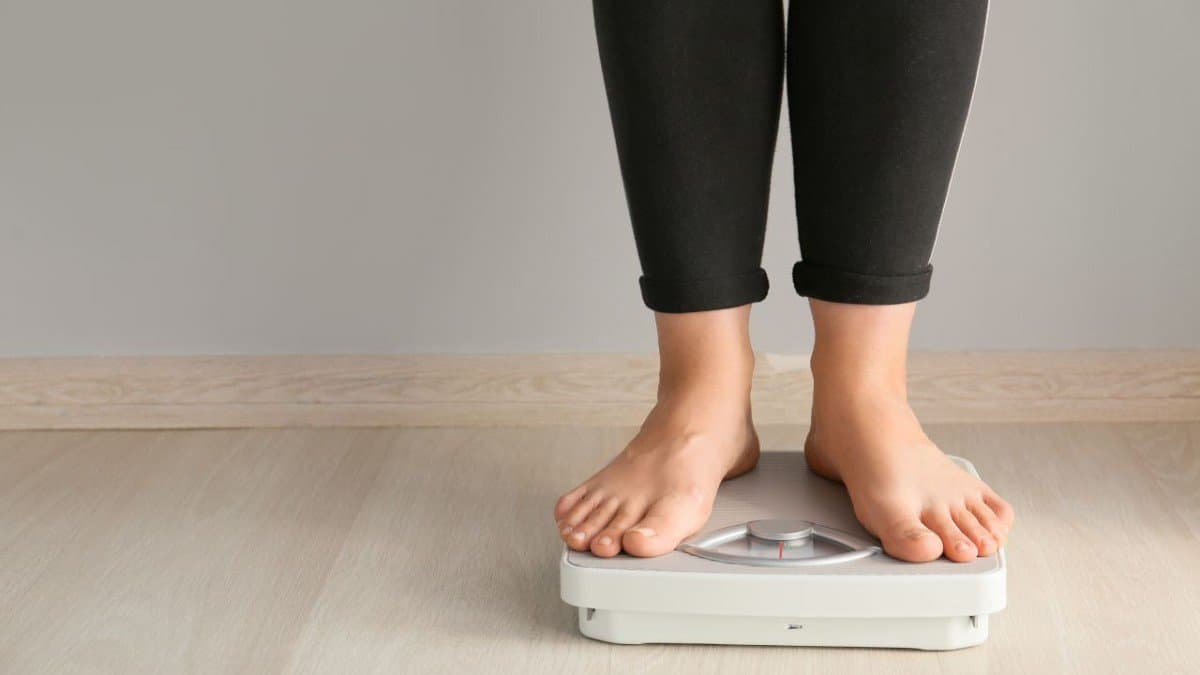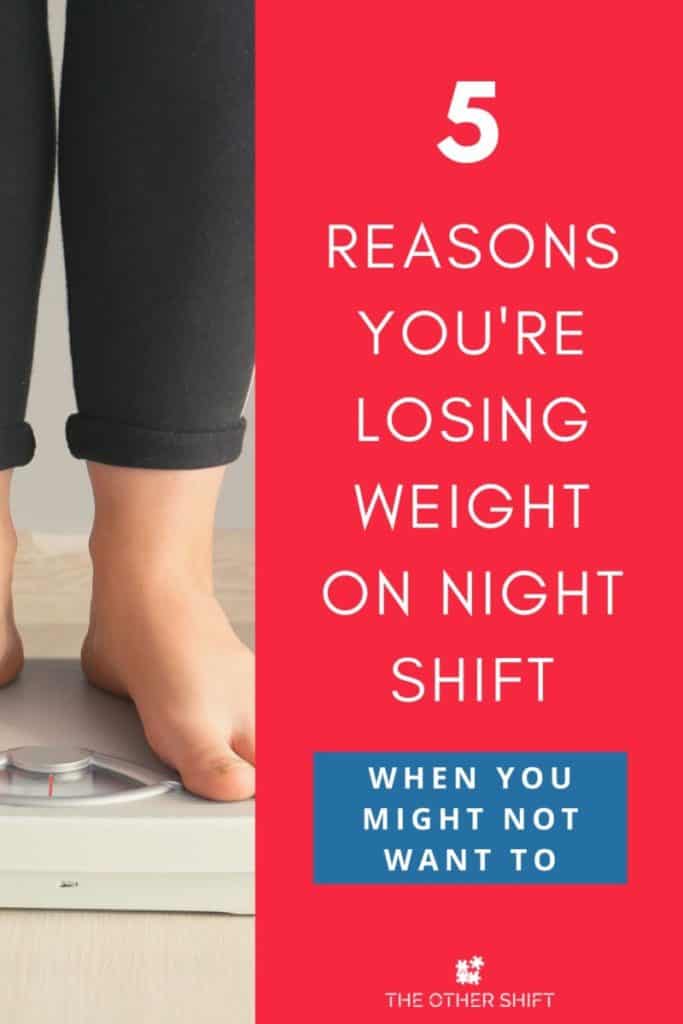Disclosure: This page may contain affiliate links, meaning we receive a commission if you decide to make a purchase through our links, but this is at no additional cost to you. Please read our disclosure and privacy statement for more info.
Weight loss from working the night shift is less talked about than weight gain. But that doesn’t mean it doesn’t happen or is less concerning.
Night shift weight loss may be deliberate or unintentional. Possible causes are your hormones, mood, eating behaviors, sleep debt, increased activity levels or feelings of heightened stress. Sudden or extreme weight loss may indicate a serious medical condition.
Losing weight happens for a variety of reasons, most of which can be attributed to something you’re doing differently. Once you’re able to pinpoint what’s causing the weight loss, you’ll be able to make adjustments where necessary.
Changes in Your Eating Behaviors
Your first step to identifying why you’re experiencing weight loss on night shift starts with examining your eating habits. You’re likely to find that something different in your daily routine has caused this weight loss. By taking a closer look at yourself, you may find the source of the problem is your digestive system.
Hormone fluctuations
One possible reason you’re losing weight is hormones and hunger. Your body produces the hormone leptin which is responsible for suppressing hunger. It also produces another hormone called ghrelin that stimulates hunger. I read in a great shift working book, that ghrelin likes to growl at you when you’re hungry. This helps me decipher between the two hormones.
Night shift’s disruption to your circadian rhythm impacts the dispersal of these two hunger hormones. When your appetite doesn’t align with your eating schedule you’ll either eat less because you’re not hungry or skip meals altogether. It could be that hunger hits when you’re unable to eat because you’re busy working or too tired to care.
We talk more about this in the below video. I mention this about half way through which is why the video starts where it does. (but feel free to watch from the start and become a subscriber)
Meal timing
Another reason could be that your stomach gets upset when you eat at the wrong time for your body. Some people have an extra sensitive digestive system that impacts what they can eat and when. Experiencing gastrointestinal discomfort and nausea from eating at odd hours will lead you to eat less often and thus lose weight.
If it’s not your body that’s disrupting your meal time, perhaps it’s the way you’re spending time that’s to blame. Have you gotten busier at work or home, leaving you little time to eat when you should or too tired to eat when you’re able? Maybe you simply miss having mealtime with the family.
Laking an appetite
Changes in your eating habits can have a ripple effect on the rest of your well-being. Feeling lonely at lunchtime leads some people to eat less because they lack appetite. Others may replace their mealtime with something to keep their mind off how they feel.
Sleep instead of eat
On the other hand, you may find that you’re not eating as much because you’re spending more time sleeping. Grabbing a nap instead of your lunch box puts fewer calories in your fuel tank. Likewise, going straight to bed after work or sleeping later than necessary cuts down on time spent eating.
Feeling fatigued plagues multiple body functions related to digestion. In particular, you may experience a loss of appetite. Add to that the aches and pains associated with fatigue and you’re less inclined to eat.

Increased Activity Level
If a lack of calorie intake isn’t the culprit, your weight loss could be attributed to an increase in how physically active you’ve been. Are you getting your jump-start from cardio instead of coffee? Have you started exercising more to stay connected to others? If you’ve added more fitness without balancing your calories, there’s a good chance you’ll drop some weight.
Did you add exercise to your routine at work to keep yourself lively and awake? Maybe you’re staying more active to stave off boredom when things are slow. Perhaps it’s work itself that has turned up the fire.
Night shift work can vary drastically in both frequency of action and level of intensity. For example, you would expect to find the staff of an emergency room busier when working in a highly populated city versus small-town suburbs. So, if you’ve moved to a fast-paced, high-volume hospital from a slow and steady neighborhood, you might drop a few pounds while you’re adjusting. (Nurses, if this sounds like you here’s a way to not get sick whilst adjusting).
Maybe you joined a gym or started a fitness class for some quality self-care. Or you were looking for a way to squeeze in some socializing or learn a new skill. Whatever your reason, moving more may require adding some extra snacks to your routine if losing weight wasn’t part of your plan.
Need some snack ideas, here are some vegan and non-vegan snacks you’re going to love.
Any major changes to your level of activity can impact your weight. Night shift workers who lose weight do so because they’re either eating less or moving more.
By finding the right balance of calories consumed versus those burned, you’ll have an easier time managing your weight.
If you’re interested in some content about exercise, this one discusses the best exercise routine for shift workers, whilst this one discusses, Manual Labor vs The Gym. What Approach Wins in the Real World?

Stress at Work or Home
During highly stressful times, your body activates its defense system with the release of hormones. When you go into fight/flight//freeze mode, a surge of adrenaline pulses through and minimizes your appetite. Another hormone, known as cortisol, suppresses any body functions deemed unessential during trauma mode. (source) For many people, that includes hunger and the desire to eat.
Increased stress levels at work or home can also have a negative impact on your eating behaviors as well. Distracted by worry, you make poor food choices or perhaps you have limited options for quality nourishment available because you forgot to stop at the store, again.
You may even find that your weight loss comes from skipping out on mealtime entirely so that you have time to deal with the stressor.
Nervous/anxious energy
Something you may not have considered when thinking about the effects of stress are those unconscious body movements. That rapid twitching of your leg as you’re nervously tapping your foot burns up calories. While it may not seem like much, these repetitive motions add up quickly, especially when accompanied by the appetite suppression of stress.
Addressing what’s stressing you is vital to your gastrointestinal health. Left unchecked, your body may begin to experience stomach pain or heartburn. Other symptoms that can develop from stress include constipation or diarrhea.
We chat more about night shift and stress levels here. You’ll find realistic strategies for managing your stress and how to recognize when it’s creeping up on you.
Amazon has an entire section designated to stress relief products. They range from supplements to eye masks, to oils among many other things. Take a look at what’s on offer here.

What Science Says About Night Shift and Weight Loss
Researchers are just beginning to take a better look at the relationship between working the night shift and weight loss.
One study of workers in Korea examined night shift effects on involuntary changes in weight. They looked at a representative sample to determine if a correlation between working the night shift and weight loss existed.
They were able to confirm a relationship did exist and affected men and women differently. They found that men were more likely to gain weight rather than lose it. Women working night shifts experienced both weight loss and weight gain among the sampled population.
The researchers believe studying the effects of the night shift on weight management further could help isolate the root causes. They hope this study offers guidance to companies seeking ways to help employees obtain a healthier lifestyle. Initiatives such as providing nutritious meals and snacks at work will benefit both the employees’ health and the employer’s profit margin.
For the employers reading this, we wrote two articles which will be of interest, the first 15 Employee Engagement Activities to Skyrocket Staff Morale and the second What Is Shift Bidding? A Savvy Roster Hack to Boost Morale. We hope these help improve the feel around your workplace.
A second study on night-shift weight loss took a look at the effects of fasting as it relates to the time of day. Researchers in Australia found that time of day plays a significant role in weight control. According to their data, they learned that not eating between the hours of 1 am and 6 am resulted in modest weight loss.
These studies both reveal a little more about the night shift’s influence on weight. With continued research, scientists hope to learn more about why these correlations occur. By having a better understanding of the science behind health, night shift workers will be better equipped to lead healthier lives.

Worrisome Weight Loss
If you’re unable to attribute your weight loss to changes in behavior, activity, or stress levels, it may be the side effect of something more serious. Your first step, check any new medications that decrease appetite and may induce loss of weight. This is a common problem associated with some antibiotics, high blood pressure medicines, and medications used for epilepsy.
Your next step is to do a self-evaluation for other possible symptoms you’re experiencing. Weight loss frequently occurs with diseases of the bowel such as Crohn’s disease, stomach ulcers, ulcerative colitis, chronic liver disease, and celiac disease. Other medical conditions known to cause weight loss include,
- diabetes
- hyperthyroidism
- Addison’s disease
- emphysema
- muscle loss from congestive heart failure
- cancer
- adrenal insufficiency
- parasites
Headaches, in particular, migraines may also impact your food intake due to pain, concentration to buy and prepare the food and appetite in general. In this video, we discuss why it happens commonly for night shift workers and what we can do about it.
Night Shift Weight Gain Solution
Now that’s a headline you don’t see often enough!
Though there are a fair few weight gain products out there, we like AppetiteMax. It’s a weight-enhancing supplement that targets common underlying issues linked to a poor appetite and low body weight.
Designed to help you gain smarter while supporting and nourishing your body naturally through every phase of the digestion and weight gain process.
Often ingredients in these types of products are hidden or written in such tiny text you can’t read it as there is potentially something to hide. But AppetiteMax is fully transparent as to what’s included in their products which you can see here.
I like to immerse myself in many reviews before I purchase. If you’re like me, take a look at the reviews here.
Keen to learn more? Here is a link to their FAQ section. If you still have questions, please get in touch with us at [email protected] and we will get you the answers you need.
In summary, uncovering the reason for your night shift weight loss requires a little digging. Your eating behaviors are probably the easiest to set right and you can find healthier ways to manage stress.
Most importantly, seek expert medical advice if you suspect your weight loss is related to new medication or an undiagnosed medical condition.
Thanks for reading.
Next up, if one of the other reasons you potentially don’t want to eat when working nights is because you are so cold you can’t think straight, here’s a post to explain why that happens.
Cheers,

Disclosure: This page may contain affiliate links, meaning we receive a commission if you decide to make a purchase through our links, but this is at no additional cost to you. Please read our disclosure and privacy statement for more info.

Recent Posts
An examination of the night shift professions, that while sometimes underappreciated, are necessary for civilization, in its current form, to exist. A city can be thought of as a machine. Each...
Culminated from an exhaustive yet well-funded journey into the night, this article will prepare you for life outside of work while being a denizen of the dark. During days off, night shift...

